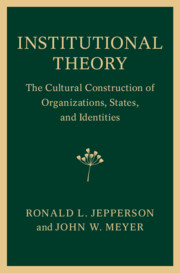Book contents
- Institutional Theory
- Institutional Theory
- Copyright page
- Contents
- Figures
- Preface
- Credits
- Part I Introduction
- Part II Institutional Theory: Its Role in Modern Social Analysis
- 2 Society without Culture:
- 3 Institutions, Institutional Effects, and Institutionalism (1991)
- 4 The Development and Application of Sociological Neoinstitutionalism (2002)
- 5 Reflections on Part II:
- Part III The Institutional Level of Analysis
- Part IV Institutions of Modernity and Postmodernity: The Construction of Actors
- Part V Conclusion
- Index
- References
5 - Reflections on Part II:
Institutional Theory
from Part II - Institutional Theory: Its Role in Modern Social Analysis
Published online by Cambridge University Press: 22 March 2021
- Institutional Theory
- Institutional Theory
- Copyright page
- Contents
- Figures
- Preface
- Credits
- Part I Introduction
- Part II Institutional Theory: Its Role in Modern Social Analysis
- 2 Society without Culture:
- 3 Institutions, Institutional Effects, and Institutionalism (1991)
- 4 The Development and Application of Sociological Neoinstitutionalism (2002)
- 5 Reflections on Part II:
- Part III The Institutional Level of Analysis
- Part IV Institutions of Modernity and Postmodernity: The Construction of Actors
- Part V Conclusion
- Index
- References
Summary
Much contemporary social science still imagines a “society without culture,” and still works with limited conceptions of institutions that understate their effects.
Keywords
- Type
- Chapter
- Information
- Institutional TheoryThe Cultural Construction of Organizations, States, and Identities, pp. 126 - 136Publisher: Cambridge University PressPrint publication year: 2021
References
- 1
- Cited by

